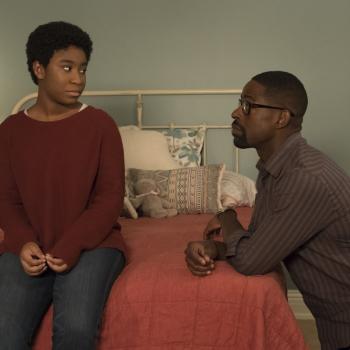I love the blog Epbot. It has a lot of fun geeky stuff, neat craft tutorials, interesting stories…and every once in a while, the blogger, Jen, lets us in on a moment of vulnerability by talking about stuff like this:
John was sick in bed, I needed some eggs to make cupcakes for a friend’s birthday, and I thought, “Hey, this is a great time for some exposure therapy! I haven’t driven myself in months, and I haven’t driven alone in years. IT’S PERFECT.”
Or… not.
I wish I could tell you I struck a blow for independence and emotional health that day, but the truth is I started shaking the moment I walked through the door of the local 7-Eleven.
You see, Jen has an anxiety disoder and agoraphobia, and she’s working through rolling back the ways those things have limited her life over the years.
I would never have called myself agoraphobic, but reading this post, I had an instant sense of recognition. My ADHD diagnoses gave me a way to understand the ways I react to people and situations, as did realizing that, frankly, I’m really pretty introverted. But I was diagnosed with Generalized Anxiety Disorder before I was diagnosed with ADHD, and those are commonly comorbid conditions for some very good reasons. When your brain is constantly craving stimulation to help it make stronger neural connections–but lacks the executive function needed to filter relevant from irrelevant sensory data–you can get both sort of hooked on adrenaline and very very easily overwhelmed, all in one contradictory bundle.
There have always been things I just didn’t do–opportunities I didn’t seize–because I didn’t know if I would be able to retreat when (not if) I became overwhelmed. I carried novels around like security blankets, to sooth me and let me retreat when I felt like my brain was starting to bounce around behind my eyes without a focus or direction.
But when I was living in a strange city, far from family, with few friends, small needy (hyperactive and destructive) children, and no consistent or reliable respite to look forward to and hang on to, the list of things I couldn’t bring myself to face alone—that made me anxious and uncomfortable just to contemplate—grew. I knew my world was shrinking, and I knew the only way to reverse that would be to face the situations that I was so uncomfortable with. But nothing frightened me quite as much as the possibility of falling apart in public with my children, and not being able to meet their needs or calm their fears. So I didn’t…
…call strangers on the phone if there was any way to avoid it. After a while, I rarely called friends or family on the phone.
…drive. Anywhere. Despite owning a car.
…go anywhere that required taking more than one bus. Most of the time, I walked.
…talk to people I didn’t know.
…talk to people I did know, but whose names I couldn’t remember after the first couple meetings.
…answer the phone if I didn’t recognize the caller ID.
There were other things I was anxious about as a result of being poor and having little local support, but these are the things that I stopped doing because they made me feel unsafe, exposed, and unable to retreat.
I’m still prone to anxiety, and I still hate making phone calls–I’m procrastinating right now about a phone call, actually. But most of the items in the list above are no longer walls that feel too tall to scale. And most of them were not so hard to overcome, with a little support.
After moving back to Canada, I spent a day driving with my Dad and found the confidence to take short trips myself along established routes, which grew into greater confidence, until I bought myself a car which I rather enjoy driving around. It’s not a big car, and I use GPS to cut down on the number of things to keep track of, and those things helped a lot, even though they shouldn’t make that much difference.
My kids are in school, and the youngest is in daycare twice a week. I spend most of that time working, but I try to get a day or two a month without deadlines or noise to get my head screwed on straight and take stock of everything I have going on, and that helps a lot too. It gives me chances to tackle phone calls and errands with less pressure and less distraction so that they don’t balloon into Big Things I Can’t Face.
Mostly, I’ve learned to be patient with myself, and to trust myself. I know, when I find some quiet to hear my own voice, what I can handle–what will be enough to bolster my confidence and expand my horizons rather than overwhelm me and shrink them still further. I know I can face any task or challenge easily if I can give myself more quiet and more time, and I know I can face them even in the midst of noise and pressure, if I have to.
I’m still awkward with social situations. I’m still working on it. But at least I know now that it’s OK to be quiet and introverted, and I make fewer faux pas when I’m not babbling with nervousness. So that’s something–silence is a tool I can work with.
Now, if I could just get my mind to hang on to names, I’d really be getting somewhere…
😉















